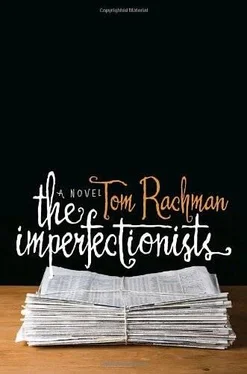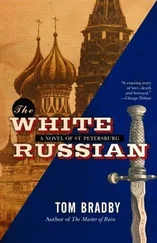Clint smiles. "I'll do whatever I got to do, man."
Arthur sleeps poorly that night-he's too impatient. When the paper arrives, he flips immediately to page nine. "Yes!" he declares. "Oh, Clint, dear, dear Clint!" Just as Arthur had hoped, Clint has destroyed the Erzberger article, condensing her life into one hundred words and making it a brief at the bottom of the dead Cuban. "Perfect," Arthur says.
He composes himself and phones Kathleen from his study. "Sorry to bug you this early at home, but did you see our obits today?"
"Obits plural?" He hears her flipping pages. Her voice turns metallic. "Why did we run this as a brief?"
"I know-I don't see why we couldn't have just held it for a day."
"You didn't know it was running like this?"
"Not a clue. I'm only seeing it now. The thing that bothers me is-well, a few things, I guess. First, there's all the money the paper spent sending me up there. Second, there's the effort I took in going back. Especially after everything that happened." He kicks the door of the study closed so Visantha won't hear.
"Exactly," Kathleen says.
"But more than anything else," he goes on, "it feels like a disservice to Gerda. An important twentieth-century writer, a serious thinker, in my view. Already she's way too overlooked. And what do we do? Clint turns her into a brief. At the bottom of some Cuban liar. I don't want to get anyone in trouble, but I find it offensive. And it makes the paper look bad. It makes us look like philistines, when all Clint needed to do was hold it for one day and then run it at full length, as I told him to. As I said you wanted. I told him, 'Don't run anything today. Kathleen would want you to hold it until tomorrow.' Anyway. I'm sorry-I'm bitching," he says. "I don't mean to slag off Clint. It's just-"
"No, you're right to be angry. I'm pretty annoyed myself."
"Could we run my piece at full length today?" He knows the answer.
"We can't report her death twice," she says.
"What stuns me is that I specifically brought up your name when Clint and I discussed this."
"Seriously?"
"I was crystal clear."
"You know what," she says, anger mounting, "I don't want your stuff under Clint anymore. This is ridiculous."
"But politically? I mean, I have to be under Clint. I'm. Which is his."
"Nothing is his."
"What about my fixtures: the puzzles and all that?"
"You shouldn't have to do that crap anyway. An intern could do that."
"Clint will give you a hard time about this."
"I'm not worried."
"I don't want to get ahead of myself here," he says, picking at the Scotch tape holding one of Pickle's old magazine clippings to the wall. "But I've been meaning to talk to you about something."
When Arthur is named the new culture editor, he moves into Clint's former office. It is deemed too blatant to make Clint sit in Arthur's old cubicle, so they find him one at the edge of the sports department, facing a pillar.
At home, the atmosphere between Arthur and Visantha is strained. She is openly hunting for a job back in the United States, and there is no talk of his returning with her. Indeed, he will be relieved when she leaves-the old Visantha is long gone anyway, just as the previous Arthur has perished.
These days, he prefers to stay late at work. After-hours, he admires his new office. True, it is smaller than those of the other section chiefs. And he is farther from the cupboard of pens. Then again, the watercooler is a good deal nearer. And this is a consolation.
1954. CORSO VITTORIO, ROME
The paper was established on Corso Vittorio Emanuele II, a broad east-west thoroughfare lined with dirty-white travertine churches and blood-orange Renaissance palazzi. Many of the buildings in central Rome were colored as if from a crayon box: dagger red, trumpet yellow, rain-cloud blue. But the paper's dour seventeenth-century building seemed to have been colored with a lead pencil: it was scribble gray, set off by a towering oak door large enough to swallow a schooner, though human beings entered through a tiny portal hinged within.
A doorman sized up new arrivals from his glass booth, pointing down the long hallway, its brilliant burgundy runner halting just short of the elevator cage, the metal door ajar, its operator sitting on a velvet stool. "Che piano, signore? What floor, sir?"
For Cyrus Ott, it was the third, formerly the headquarters of a Fascist movie magazine that went bankrupt after the fall of Mussolini. Ott rid the place of its dusty furniture and had all the interior walls knocked down, creating a wide-open newsroom, rimmed with tidy offices that looked inward, like box seats directed toward the stage. He bought wooden swivel chairs, varnished desks, brass banker's lamps, a custom-built horseshoe table for the copy editors, shiny black phones for the reporters, thirty-eight Underwood typewriters imported from New York City, thick crystal ashtrays, and thick white carpeting, with a discreet cocktail bar in the east wall.
Six months later, any visitor stepping out of the elevator at the third floor landed directly in a vibrating newsroom, the secretary's desk ahead, a handful of typing reporters left and right, a half-dozen copy editors defacing proofs at the horseshoe table. In the offices along the walls, salesmen hocked ad space, a stenographer copied down classifieds, the accountant inked ledgers. In the northwest corner was Ott's office, with PUBLISHER etched on the frosted door; in the northeast corner were Leopold T. Marsh, editor-in-chief, and Betty Lieb, news editor. Ranged nearby were senior staffers specializing in business, sports, wire copy, photos, layout. Copyboys buzzed back and forth like pollinating bees.
Printing took place in the subbasement, but it could have been another land. Unionized Italian laborers ran the deafening press down there, yet few of them ever met anyone who wrote the paper just floors above. In the late afternoon, a truck arrived with a vast roll of newsprint, which the workers slid down the incline at the back, slamming it into the loading bay shuddering the building up to the third floor. Any journalists lazing around up there-joshing with one another, legs kicked up on desks, brimmed hats dangling on shoe tips, cigarettes smoldering in ashtrays-jerked upright in immediate panic. "Fuck, is it that time already?"
Miraculously, by the 10 P.M. deadline the paper had filled every line down every column, no matter the last-minute heart palpitations and blaspheming. Editors rose from their desks for the first time in hours, shrugging tortured shoulder muscles, attempting to exhale.
Most of the journalists were men, Americans chiefly, but with a few Britons, Canadians, and Australians, too. All had been based in Italy when hired, and all could speak the local language. But the paper's newsroom was strictly Anglophone. Someone hung a sign on the elevator door that read, LASCIATE OGNI SPERANZA, VOI CH'USCITE-OUTSIDE IS ITALY.
And when staffers went downstairs for sandwiches they'd say, "I'm headed to Italy -anyone need anything?"
The first full year of operations, 1954, was packed with news: the McCarthy hearings, the Soviets testing a nuclear weapon, the Dow Jones closing at a record high of 382 points. Initially, the paper suffered under the suspicion that it was an international mouthpiece for Ott's business empire, but this was unfounded. The greatest influence over content was necessity-they had holes to fill on every page and jammed in any vaguely newsworthy string of words, provided it didn't include expletives, which they were apparently saving for their own use around the office.
Betty and Leo ran the editorial operations jointly. He liked to say, "I handle the big picture." But it was Betty who wrote-or rewrote-most of the copy; she had an effortless way with prose. As for Ott, he handled the money side and offered advice when solicited, which was often. Betty and Leo speedwalked across the newsroom to his office, each trying to get in the door first. Solemnly, Ott listened, staring at the carpet. Then he looked up, pale blue eyes flitting between Betty and Leo, and issued his ruling.
Читать дальше












